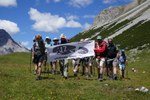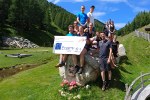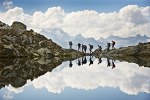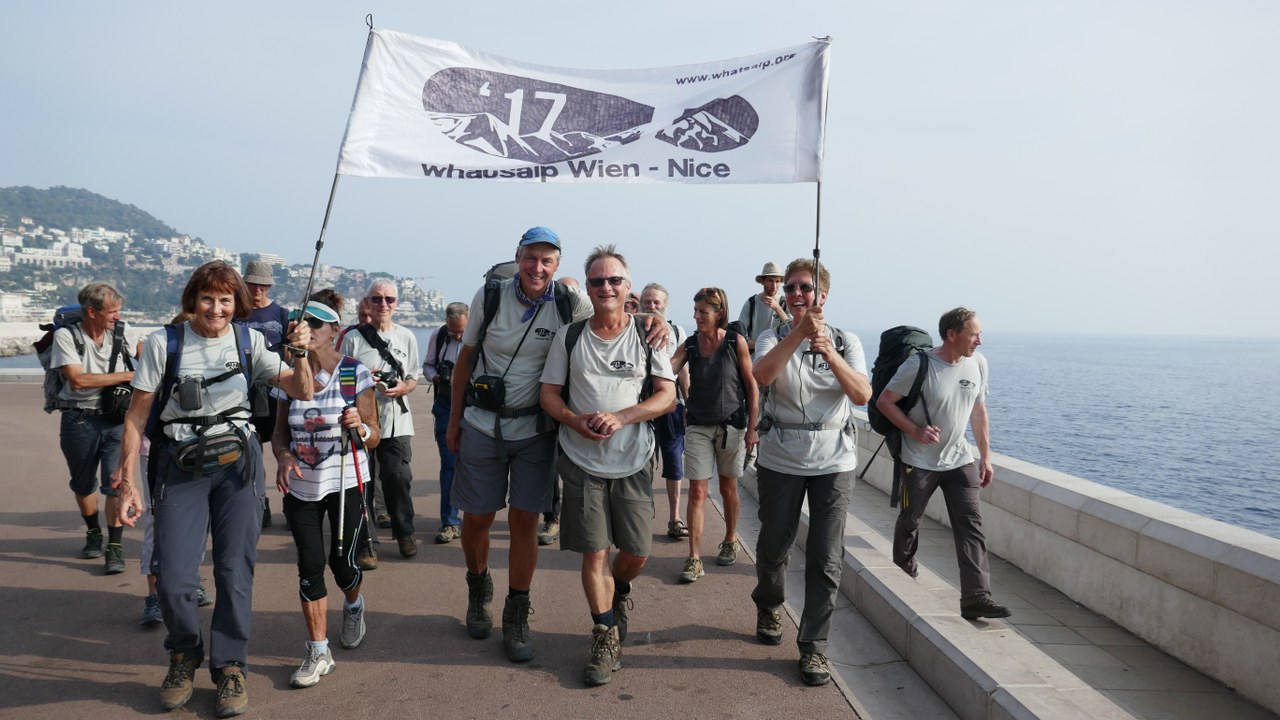Media releases
Alpine crossing “whatsalp” successfully completed
On the journey of 1,800 kilometres around 200 co-hikers accompanied the core group of whatsalp in stages. The core team consisted of the Swiss geographers Dominik Siegrist and Harry Spiess as well as the Austrian Alpine experts Christian Baumgartner and Gerhard Stürzlinger.
The European Alps presented themself to the whatsalp team as a diverse and exciting region. They are, on the one hand, characterized by strong population growth, and on the other hand they are increasingly affected by a large-scale emigration in many regions. During the meetings and discussions with local people, the whatsalp team received the impression that today the young generation is significantly less represented in the mountain regions compared to 1992. “To change this, we need new strategies and models adapted to the respective national and regional circumstances,” says Harry Spiess of the whatsalp core team. It would be necessary to slow down the strong growth of the Alpine cities and to make the Alpine regions more attractive for living and working again, particularly for young people. Thirty of them accompanied the hiking group in sequences as part of the CIPRA project whatsalp youth.
The results of the Alpine crossing whatsalp in four points:
1) The Alps are even more affected by climate change and its consequences than in 1992. The whatsalp group has experienced the accelerated melting of glaciers such as at the Rhone glacier/CH or the Grande Motte near Val d’ Isère/F, leading to a loss of quality of the Alpine landscape. It can be observed, that, as a result of a lack of snow, many ski regions in the Alps will be upgraded with expensive snowmaking equipment, slope levelling and reservoirs. Core team member Christian Baumgartner notes: “Climate-related natural hazards are increasing, as the landslide in the Swiss mountain village Bondo in Val Bregaglia has shown drastically.” Climate protection requires more consistent solutions than today and the mountain regions would need to receive special attention in the framework of climate policy.
2) In addition to the globally oriented non-ecological intensive tourism, which has been intensified compared to 1992, the whatsalp hikers have experienced new forms of nature-based tourism in the Alps, for example the project “100% Valposchiavo” in Grisons/CH and the Valle Maira/I. Core team member Dominik Siegrist adds to this: “Alpine tourism urgently needs a reform in the direction of sustainability, be it with greening of intensive tourism, or also with the more consistent encouragement of a nature-based tourism adapted to the respective local conditions.”
3) The traffic of transit goods on the road has continued to increase over the last 25 years, and also motorized leisure traffic has developed strongly. “We have dealt with a number of projects to promote soft mobility”, explains Gerhard Stürzlinger of the whatsalp core team. In spite of positive approaches such as those introduced by the Swiss Alpine Initiative into national policy, however, it was not possible to curb the excessive motorized transport of goods and leisure traffic in the Alps. The Alpine states and the EU are called upon to create effective regulation and support instruments to curb transit traffic, to shift goods traffic to rail and to soothe motorized leisure traffic, asks Gerhard Stürzlinger.
4) Organic farming has become a reality in many valleys of the Alps since 1992, as the example of the “Ramsauer Bioniere” in Styria impressively shows, while in other places less ecological agriculture still dominates. Within the framework of agricultural policy, the greening of mountain farming must be further promoted and incentives should be created to strengthen cooperation between agriculture and tourism.
A detailed summary of the whatsalp project in German, French, Italian, Slovenian and English as well as country-specific media releases for Austria, Italy, France and Switzerland can be found here: https://whatsalp.org/de/medien/
Any questions should be sent to:
Dominik Siegrist, core team whatsalp, [email protected]; Tel +41 79 673 43 30
Maya Mathias, Project Assistant CIPRA International, [email protected], +423 237 5353
| Type | Title |
|---|---|

|
Media release 05. October 2017 |





